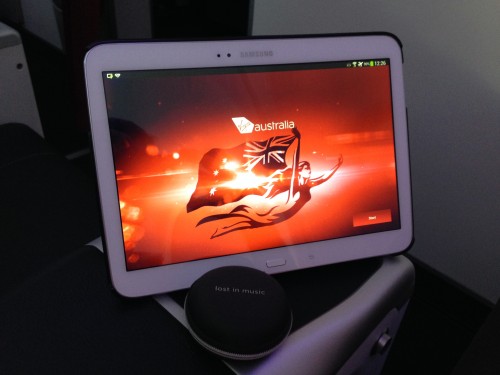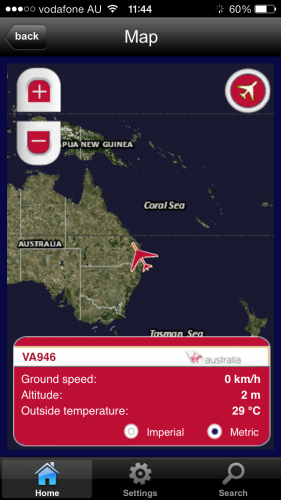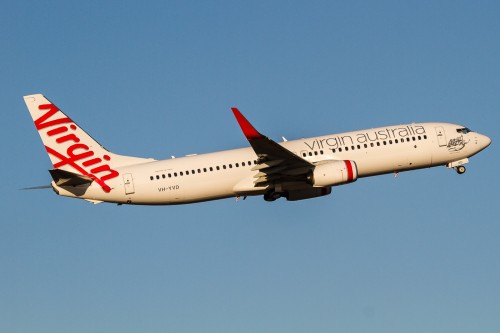
Virgin Australia’s new livery showcasing their transition to a premium-focused carrier Photo: Jacob Pfleger | AirlineReporter
VIRGIN AUSTRALIA BUSINESS CLASS REVIEW BASICS:
Airline: Virgin Australia
Aircraft: Boeing 737-800 (VH-YIF)
Departed: Brisbane Airport (BNE)
Arrived: Sydney Kingsford Smith Airport (SYD)
Stops: Non-stop flight
Class: Business class
Seat: 1F
Length: About 1.5 hours
Cheers: Fresh and funky looking cabin interior and great catering for such a short flight
Jeers: No foot-rests and no curtain divider thus limiting privacy
Overall: A great new business product on the Australian domestic market which with a few improvements will give competitors a run for their money.
During the last two years, perhaps no other airline has gone through as much transformation as Virgin Australia. Starting off as the first true low-cost carrier (LCC) in Australia in 2000 (then known as Virgin Blue) it quickly became a popular choice for leisure travelers. As the Australian market became more saturated with LCCs, Virgin decided it was time to remodel and focus more instead on the premium market. This transformation included the introduction of a business class across the fleet, with all aircraft having completed the re-fit by the 3rd quarter of 2013.
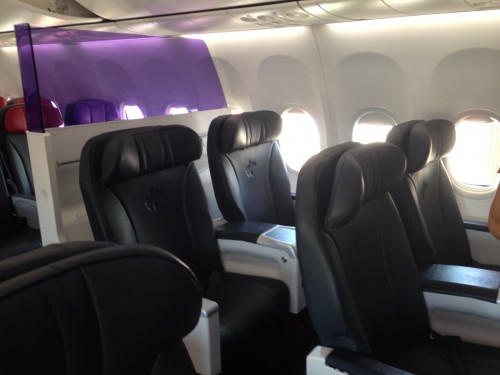
Eight-seat business cabin onboard the 737-800, with divider – Photo: Jacob Pfleger | AirlineReporter
Arriving from an international flight, I had allowed three hours for my connection. Thankfully the arrival process was very quick, and I was offered an earlier flight to Sydney.
Unlike most carriers, Virgin Australia has opted for an eight-seat 2-2 configuration in their business cabin on the 737. At the present time, Virgin holds 42% of the Australian domestic business/premium market, and as such it would not be surprising to see them reconfigure their fleet to further increase their premium market share.
My aircraft was reg number VH-YIF, one of the new 737-800’s in the fleet fitted with the Boeing Sky Interior. Walking into the cabin, I got the impression of entering a nightclub with the purple mood lighting exuding a feel of elegance and class not associated with classic legacy carriers.
An interesting element of the cabin was the cabin divider. Unlike conventional curtain dividers, Virgin Australia has opted for a plastic one of fluorescent purple. There is also no curtain in the aisle, but a magnetic rope which is supposed to add a feel of true exclusivity to the whole experience.
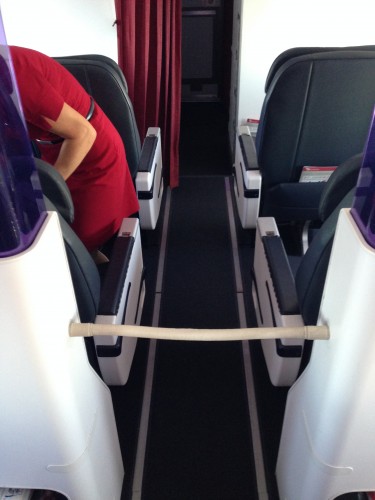
A “rope of exclusivity” is used as opposed to separate business from economy Photo: Jacob Pfleger | AirlineReporter
It is evident from the seats that Virgin Australia still has a few things to learn about premium products. Unless you are able to get a bulkhead seat, the legroom really is not more than 34 inches, which really is below the business standard even for domestic flying.
Second, the recline of the seat is somewhat limited, and my biggest gripe is that there is no footrest built into the seat. Having said that, the leather and cushioning are very comfortable and the seat comes with in-seat power supply.
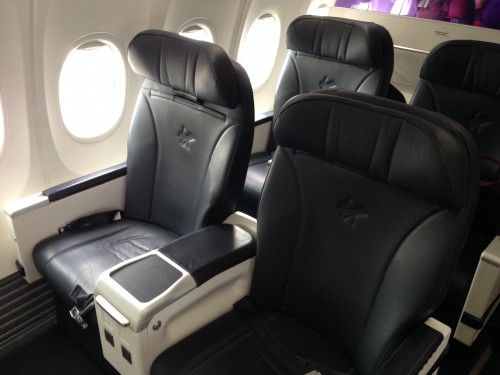
The business seating lacks a few core features such as a footrest; the legroom is also a bit tight Photo: Jacob Pfleger | AirlineReporter
As the flight was scheduled for a noon departure, a lunch service was offered on board. There were two options for main; quinoa salad or duck pie with peas. I opted for the duck pie which was served together with a warm bread roll and cheesecake. Whilst the quality and size of the main was sufficient, it would’ve been nice to have a side salad and maybe some cheese and crackers to go with the meal.
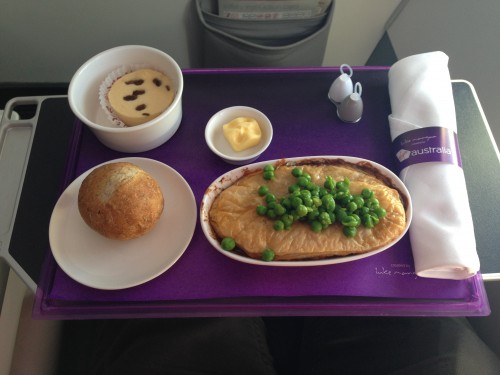
Lunch consisting of duck pie with peas, cheesecake, and a roll Photo: Jacob Pfleger | AirlineReporter
A full bar service was also offered with my glass never going empty. My drink of choice was the “Australian cocktail” which was developed by Virgin Australia’s lead chef Luke Mangan. The non-alcoholic cocktail consists of cranberry juice, ginger, and lime among other things. It is a refreshing and refined addition to an otherwise standard beverage list.
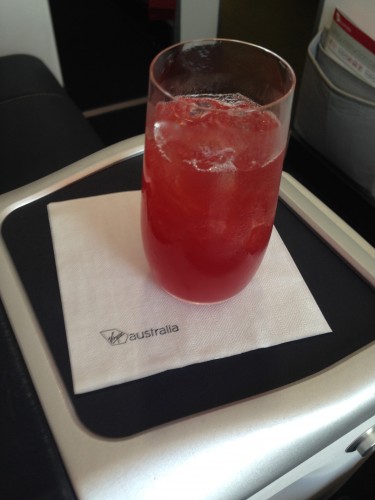
The “Australian” cocktail, a refreshing beverage to start any flight Photo: Jacob Pfleger | AirlineReporter
As part of the transition from an LCC, Virgin Australia has introduced a cutting-edge In-Flight Entertainment (IFE) system. In order to access the IFE, passengers must first download the IFE app onto their device and then once on-board they can access the IFE content through a WiFi connection.
Business class passengers have the option to either use their own device, or a provided Samsung Galaxy tablet. The IFE provides an extensive range of content; I was also pleased to see that there is an airshow program, which is always a welcome IFE addition for any AvGeek.
The crew have also gone through a significant transformation from the old LCC days of Virgin Blue. They are now more focused on business travelers, with all guests being addressed by surname. Whilst I do not mind the transition to a more professional and corporate-focused attitude of the crew, I did prefer the old style where the crew would even have a joke or two on the P.A.
In my opinion Virgin Australia presently delivers a very competitive business class product and with a few minor improvements, I am sure it will gain the majority of the premium market within Australia.
